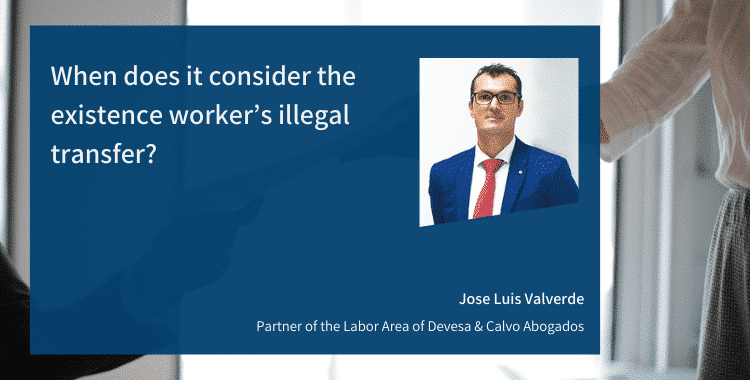
When does it consider the existence worker’s illegal transfer?
It is increasingly common for companies to organize the development of their business activity, through figures known as outsourcing.
This term implies a cost reduction and limitation of liability of the “client company”, to which such services are provided, derived from the labour relations with the persons providing those external services from which they benefit, seeking to reduce it to the transferring company which provides them.
However, rarely do employers stop to analyse the possible disadvantages that may result from the improper use of these figures, especially in business structures belonging to the same group. Article 43 of the Worker’s Statute (Estatuto de los Trabajadores) regulates this issue stipulating that the employment of workers for its temporary assignment to another undertaking may only be effected through duly authorised temporary employment agencies, and in the established terms for that purpose by the specific implementing legislation.
It is particularly important to analyze the possibility of the decentralization measure masking a breach of the provisions of article 43 of the Worker’s Statutes (Estatuto de los Trabajadores), and consequently a workers’ illegal transfer taking place.
This worker’s illegal transfer takes place when there is a mere provision for them, when the business which transfers the workers lacks means and organization of its own, or does not exercise its inherent functions within its status as an employer.
In other words, when the object of the service contracts between the companies is limited to a mere provision of the workers from the transferor company to the transferee company.
To determine when a workers’ illegal transfer is taking place requires analyzing various circumstances which have been considered by case law as the criteria for establishing the existence or not of such conduct, among which we should highlight the following:
- Own policy of action with its staff: This requires that the transferring company has authority to determine the salaries of its workers, of the billing by hours, by unit price, by objects, etc. All these issues should be defined by the transferring company for its employees and not by the main company.
- Specific form of provision of services: It is also required that the transfering company establishes the day, breaks, holidays, training, etc. It is considered illegal transfer if the form of services’ provision is determined by the client company or transferee.
- Management power and disciplinary power: That is, who gives the orders, to whom the workers report back, receive activity or are disciplined. Each company must have its own management and disciplinary power.
- Material means: The transferring company that is hired to provide a certain service outsourced by the client company or transferee, must have its own material means, and must never act with those from the main company. However, there are exceptional circumstances depending on the specific conditions of said material means, which can make admissible the titularity of the material means held by the client company, as long as it rents them out.
- Organization of the contracted work or service: It must be the transferring company the one which organizes or manages the hired work or service, and not that the managers of the main company organize the work of the hired workers.
- Business risk: The client or transferee company shall not assume any risk in the hiring, organization and execution of the work or service, but that business risk should be assumed by the transferring company.
- Subject matter of the contract: Finally, there must be a possibility of differentiation between what the main company does and the activity of the hired one. It is suspicious when the hired activity can be perfectly performed by the workers of the main company.
The clearest examples of workers’ illegal transfer are:
1º. -) When the means and equipment for the service provision are of the client company or transferee. In this case, this question has been resolved by the Supreme Court, which has considered as evidence of the existence of such a workers’ illegal transfer, the fact that the client company provides the premises where the staff was located, facilitates computer and telephone equipment to provide its service.
2º. -) When the transferring company does not carry out work control tasks. In these cases the Supreme Court has also concluded that there is a workers’ illegal transfer, when it can be considered duly justified that the transferee company has a decisive role in the recruitment of staff by the transferring company, reserves the right to refuse any worker without the need of justifying itself, plans the schedules and shifts given directly to those workers, because in these cases it is concluded that the organization power and management of the company are exercised by the transferee, and the transferring company is solely and exclusively the formal employer of these workers. Nevertheless, it is true that it is not unanimous that the mere fact that the transferee can reject any worker without justifying the reason is sufficient to consider the same as the real employer.
The effects which a declaration of the existence of a workers’ illegal transfer has for them is the one which they are entitled to:
- Acquire the condition as a fixed employee in any of the companies involved in the illegal cession, counting the seniority since the beginning of the illegal cession.
- To demand equality with the working conditions that can be enjoyed by the workers of the client company or transferee, especially the differences in wages that could correspond to it because they usually have a higher remuneration.
Moreover, the effects of such a declaration on the involved companies are:
- They shall be jointly and severally liable for their obligations towards workers and social security.
- They may be punished for violating the provisions of article 8.2 of Royal Legislative Decree 5/2000 of 4rd of August, which approves the revised text of the Law on Infringements and Sanctions in the Social Order (Ley sobre Infracciones y Sanciones en el Orden Social), with a fine of between 6,251 00. – Euros and 187,515 00. – Euros.
- However, such conduct could also be considered to involve the commission of an offence under article 311 of the Criminal Code (Código Penal), which is considered to involve the imposition on workers of harmful working conditions, abolish or restrict the rights recognized by law, collective agreements or individual contracts, through deception or abuse of need, which is punishable by imprisonment for six months to six years and a fine of six to twelve months.
José Luis Valverde Moreno – Manzanero
Partner of the Labor Area of Devesa & Calvo Abogados.
